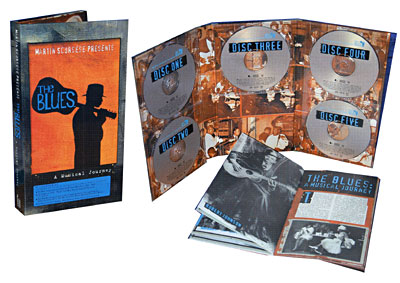

- MARTIN SCORSESE PRESENTS THE BLUES MUDDY WATERS FULL
- MARTIN SCORSESE PRESENTS THE BLUES MUDDY WATERS SERIES
This is a poignant statement, given how much the musicians themselves had to hide in their music - bluesman Willie King suggests that lyrics full of anguish over how a woman done her man wrong were actually aimed at "the bossman," adding with a shake of the head, that saying it straight out would get a man hanged from the nearest tree.Īll seven of the films mix modern musicians with historical figures, partly to help showcase rarely seen archival footage of pioneers from the early part of the 20th century. The blues was another side of America and it was very clear to me it was at least as true as everything else, but it was different. "I knew America through the movies and growing up in postwar Germany, through books and photography and magazines, and the blues was like a correcting voice to any of that. "I discovered the blues in the early '60s, and for me it was an incredible ingredient of the image of America," he says. The social and political subtext of the music is what spoke to Wenders. Harris arrives in Mali in western Africa, he says, "Everything felt familiar and strange at the same time." He means this both personally and musically, pointing out that slaves brought the rhythms and instruments of western Africa, such as the fife and drum, to the US during colonial America. Several musicians attempt to define the blues: One says that blues is what happens between a man and a woman. Of the seven films, Scorsese's "Feel Like Going Home," which kicks off the series, takes the most conventional documentary approach, tracking the musical roots of blues and following them forward.Ĭontemporary blues singer and music preservationist Corey Harris travels to Mississippi and Africa, talking to famous musicians and common folk alike. And I think that's pretty evident in the kinds of movies I make." "I have lived with it over the years," he says, "and it's sort of scored my life in a way.

When he visualizes a film, he listens to the blues for inspiration. He adds that music has always been an integral part of creating movies. "My work has always been fueled by music, and I have a very strong feeling about music, all kind of music, particularly the blues."
MARTIN SCORSESE PRESENTS THE BLUES MUDDY WATERS SERIES
I think that's why this is so important."Ī native New Yorker known for gritty gangster films, series executive producer Scorsese says the blues have influenced his work from the beginning. Wenders, "not only young people, also middle-aged people and even old people, who listen to their rock 'n' roll or their rap or their hip-hop and they don't really know where all of this is coming from. "There are so many young people out there today," says German director Mr. The filmmakers say they felt a need to show the roots of today's popular music. The films showcase an A-list of living blues musicians, as well as archival footage of early pioneers - B.B. "This is a labor of love, it's about music and the blues," says Scorsese, "it's not that you planned to do it you had to do it." Scorsese, Mike Figgis, Wim Wenders, and Clint Eastwood. They are the artistic impressions of the music as lovingly, even reverently assembled by seven different film directors, including Mr. Unlike public televisions' earlier 10-part musical opus, "Jazz," the seven films in "Martin Scorsese Presents the Blues: A Musical Journey" beginning Sunday, are not chronological, nor are they comprehensive. Handy heard a slide guitar making melancholy music in a Mississippi train station. But for the purposes of the congressional proclamation that decreed 2003 The Year of the Blues, the blues were "born" in 1903 when cornet player W.C. Just what makes this year the birthday of the blues is a bit arbitrary, given that musicologists trace the roots of this musical form back hundreds of years to Africa.

The blues turned 100 this year, and PBS is celebrating with a week-long party hosted by director Martin Scorsese.


 0 kommentar(er)
0 kommentar(er)
